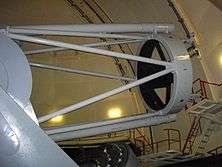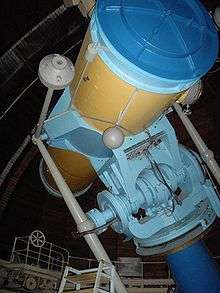Crimean Astrophysical Observatory
|
The observatory's logo | |||||||||||||
| Alternative names |
Krymskai︠a︡ astrofizicheskai︠a︡ observatorii︠a︡ | ||||||||||||
|---|---|---|---|---|---|---|---|---|---|---|---|---|---|
| Observatory code |
095 | ||||||||||||
| Location | near Nauchny, Crimea | ||||||||||||
| Coordinates | 44°43′36″N 34°0′57.1″E / 44.72667°N 34.015861°ECoordinates: 44°43′36″N 34°0′57.1″E / 44.72667°N 34.015861°E | ||||||||||||
| Established |
1945 | ||||||||||||
| Website |
crao | ||||||||||||
| Telescopes | |||||||||||||
| |||||||||||||
|
| |||||||||||||
| see § List of discovered minor planets |
The Crimean Astrophysical Observatory (CrAO, obs. code: 095) is located at Nauchnij research campus, near the Central Crimean city of Bakhchysarai, on the Crimean peninsula. CrAO is often called simply by its location and campus name, Crimea–Nauchnij, still ranks among the worldwide most prolific discovery sites for minor planets.[2]
CrAO has also been publishing the Bulletin of the Crimean Astrophysical Observatory since 1947, in English since 1977. The observatory facilities (IAU code 095) are located on territory of settlement of Nauchny since the mid-1950s; before that, they were further south, near Simeiz. The latter facilities still see some use, and are referred to as the Crimean Astrophysical Observatory–Simeiz (IAU code 094).
List of discovered minor planets
As of 2016, the Minor Planet Center (MPC) gives a total of 1286 numbered minor planets that were discovered at the Crimea–Nauchnij observatory site during 1966–2007.[2] Most of these discovery are credited to the Russian/Soviet astronomers Tamara Smirnova, Lyudmila Chernykh, Nikolai Chernykh, Lyudmila Zhuravleva, Bella A. Burnasheva, Nikolaj Efimovič Kuročkin, Lyudmila Karachkina, Natal'ja Vital'evna Metlova and Galina Ričardovna Kastel'. As a peculiarity, British astronomer and long-time MPC director Brian G. Marsden is also credited with the co-discovery of 37556 Svyaztie at Nauchnij in 1982, as a symbolic gesture of the astronomical collaborations and friendships between the East and the West during the Cold War.[3]
The MPC also credits the discovery of the following minor planets directly to the observatory (rather than to one of the above listed astronomers):[1]
| 2094 Magnitka | 12 October 1971 | list |
| 2163 Korczak | 16 September 1971 | list |
| 2170 Byelorussia | 16 September 1971 | list |
| 2406 Orelskaya | 20 August 1966 | list |
| 2698 Azerbajdzhan | 11 October 1971 | list |
| 2949 Kaverznev | 9 August 1970 | list |
| 4004 List'ev | 16 September 1971 | list |
| 4466 Abai | 23 September 1971 | list |
| 4916 Brumberg | 10 August 1970 | list |
| 4917 Yurilvovia | 28 September 1973 | list |
| 5706 Finkelstein | 23 September 1971 | list |
| 18284 Tsereteli | 10 August 1970 | list |
| 109573 Mishasmirnov | 20 August 2001 | list |
| (364566) 2007 PM8 | 10 August 2007 | list |
Gallery




See also

References
- 1 2 "Minor Planet Discoverers (by number)". Minor Planet Center. 14 November 2016. Archived from the original on 28 June 2012. Retrieved 30 November 2016.
- 1 2 "Minor Planet Discovery Sites". Minor Planet Center. 16 November 2016. Retrieved 30 November 2016.
The following table lists the total number of discoveries made at each of the most prolific discovery sites, arranged in decreasing order of number of discoveries.
- ↑ Schmadel, Lutz D. (2007). Dictionary of Minor Planet Names – (37556) Svyaztie. Springer Berlin Heidelberg. pp. 892–893. ISBN 978-3-540-00238-3. Retrieved 30 November 2016.
